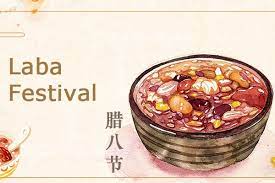(单词翻译:单击)
Traditionally, Chinese people begin preparing for the new year starting from the Laba Festival,
按照传统,从腊八节开始,中国人就要为新年做准备了,
which falls on the eighth day of the twelfth month in the traditional Chinese calendar.
每年的农历十二月初八就是腊八节。
This year it's on January 10th, 2022.
而2022年的腊八节则是在阳历1月10日。
What's the origin of this holiday? It actually wasn't called Laba at first.
这个节日的由来是什么?其实一开始它并不叫腊八。
In The Book of Rites or Liji, it was written that emperors would do a ritual called La in the twelfth month
《礼记》一书中曾记载,君王们会在十二月进行一种叫做‘腊’的仪式,
to show appreciation to eight deities who govern agriculture and ask for blessings for the new year.
以此表达对八位掌管农业的神明的感激,并为新年祈福。
Therefore, the twelfth month of the year is named the La month and the day this ritual is held on is called the La day.
因此,一年的第十二个月被命名为‘腊月’,并且举行仪式的这一天被称为‘腊日’
This was the original festival before Laba existed.
这就是腊八节的前身。
It is believed that this La ritual was originally created by Shennong or the Divine Farmer during the Three Sovereigns period.
据信,这种被称为‘腊’的仪式最初是在三皇五帝时期由神农所创造。
This custom was then passed down and practiced during every dynasty later on.
后来这一习俗代代相传,并且各朝各代都遵循这一习俗。
Part of this La day celebration includes worshiping the deities, as well as having a large feast.
腊日这一天的庆祝活动包括祭拜众神以及吃筵席。
It was recorded that Confucius and his disciple Zigong had a conversation after watching a La ritual celebration.
据记载,孔子及其弟子子贡在观看了一场腊仪式后进行了交谈。
Confucius asked Zigong if he's happy seeing the celebration.
孔子问子贡看到仪式开不开心。
Zigong replied, "The entire country is celebrating like they are going wild. I don't see what's there to be so happy about."
子贡回答,“整个国家都在欢快地庆祝,但我看不出有什么好高兴的。”
Confucius said, "People worked so hard for a whole year but only get to celebrate for one day.
孔子回答,“大家辛苦劳作了一整年,却只有一天可以庆祝。
That's not something you can understand.
这不是你所能够理解的。
Allowing people to strike a proper balance between work and rest is the way great sage rulers like King Wen and King Wu of Zhou manage their country."
让人民劳逸结合,是像周文王、周武王这样的贤人的治国之道。”
So back then, La represented the end of the year, a time to rest and celebrate as well as conducting rituals to worship and thank the agriculture deities.
所以那时,腊代表着一年的年末,是修整、庆祝以及进行祭拜仪式,感谢掌管农业的神明的日子。
After Buddhism was introduced to China during the Han Dynasty, the story of how Shākyamuni came to enlightenment also became popular in China.
在汉朝时期,佛教被引入中国,释迦牟尼如何成道的故事也在中国流行起来。

According to the Genealogy of Shākyamuni from the Liang dynasty,
根据梁朝的释迦牟尼家族谱系,
Shākyamuni was born a prince but renounced his wealth and position to pursue cultivation in the woods.
释迦牟尼一出生便是王子,但他放弃了自己的财富和地位到树林里修行。
He practiced asceticism and only ate two pieces of grain per day and sometimes only two pieces per week.
他实行禁欲主义,每天只吃两粒谷物,有时每周只吃两粒。
He suffered for six years and his body became extremely weak. One milk maid offered milk-rice congee to the prince.
经历了六年的苦行,他的身体变得极其虚弱。一个挤奶女将牛奶粥送给这位王子。
He realized suffering alone is not the right path to enlightenment.
他意识到独身苦行并不是成道的正确途径。
So he ate the congee, regained enough strength and eventually attained righteous fruition, therefore becoming known as the Buddha.
因此他吃了这碗粥,恢复了足够的体力,最终获得了正义的果实,因而得道成佛。
The day Shākyamuni achieved enlightenment is the eighth day of the twelfth month in the traditional Chinese calendar.
释迦牟尼得道这一天是农历十二月初八。
It is therefore called Laba festival in China.
因此,在中国这一天被称为腊八节。
La refers to the twelfth month or La month, and Ba means eight in Chinese, referring to the date.
腊指的是十二月(也称腊月),而八则意味着中文数字8,指的是日期。
It is also known as the Enlightenment Day of Buddha Shākyamuni.
这一天也被称为释迦牟尼佛成道日。
Buddhist monks and laypeople would make mixed grain congee on this day to celebrate this event.
佛教僧侣和普通人都会在这一天做杂粮粥来庆祝这一大事。
As Chinese buddhism became more and more rooted in China, it also influenced Chinese culture.
随着中国佛教在中国生根发芽,它也对中国文化产生了影响。
The Laba festival and La day celebration eventually merged into one holiday.
腊八节和腊日庆祝最终融合成一种节日。
And now making and eating grain congee is the most symbolic custom of this holiday.
而制作和享用杂粮粥是这个节日最具象征意义的习俗。
The mixed grain congee monks make on Laba festival is called the Laba congee, but was also referred to as the buddha congee.
僧侣在腊八节制作的杂粮粥被称为腊八粥,也被称为佛粥。
During the Song dynasty, there were seven ingredients in the congee to represent the seven treasures of Chinese buddhism.
在宋朝,粥中有七种食材,代表着中国佛教的七宝。
People would start cooking it the night before, offer it to the buddha when it's ready, and then eat it or gift it to others.
人们会在头天晚上开始煮粥,做好后就把粥献给佛陀,然后吃掉或送给别人。
By the Qing dynasty, there were more and more ingredients added to the list,
到了清朝,粥中食材变得越来越多,
such as yellow rice, white rice, glutinous rice, foxtail millet, water chestnut, chestnut, red cowpea,
比如黄米、白米、糯米、谷子、荸荠、板栗、红豇豆、
jujube paste, peach kernels, almonds, peanuts, pine nuts, hazelnuts, melon seeds, grapes, and more.
枣泥、桃仁、杏仁、花生、松子、榛子、瓜子、葡萄等等。
And the Laba congee also got a new name, called "babaozhou" in Chinese,
腊八粥还有了一个新的名字--八宝粥,
which means eight treasure congee, even though sometimes there are a lot more than eight ingredients in there.
代表着八种珍宝的粥,虽然有时粥中食材不止八种。


